by Brian Hioe
語言:
English
Photo Credit: Brian Hioe
THE SORDID SAGA of the South Korean Hydis workers seeking justice in Taiwan has had a damper put in it for the time being, it seems, with the deportation of eight Hydis workers to South Korea after arrest. Though Hydis workers have promised to return and, certainly, other Hydis workers in South Korea remain free to travel to Taiwan to continue the struggle, what remains next will largely depend on the Taiwanese supporters of Hydis and their ability to continue the struggle. The struggle of Hydis workers, of course, has been ongoing, although the efforts of their Taiwanese allies has also been persistent. We need take the events of the past few days and the possible inability of Hydis workers to reenter Taiwan in the future as just more added on the long list of tragedies that Hydis workers have experienced lately, for example, with the suicide of their union leader Bae Jae-Hyoung last month, apparently out of a sense of helplessness to resolve the issue.
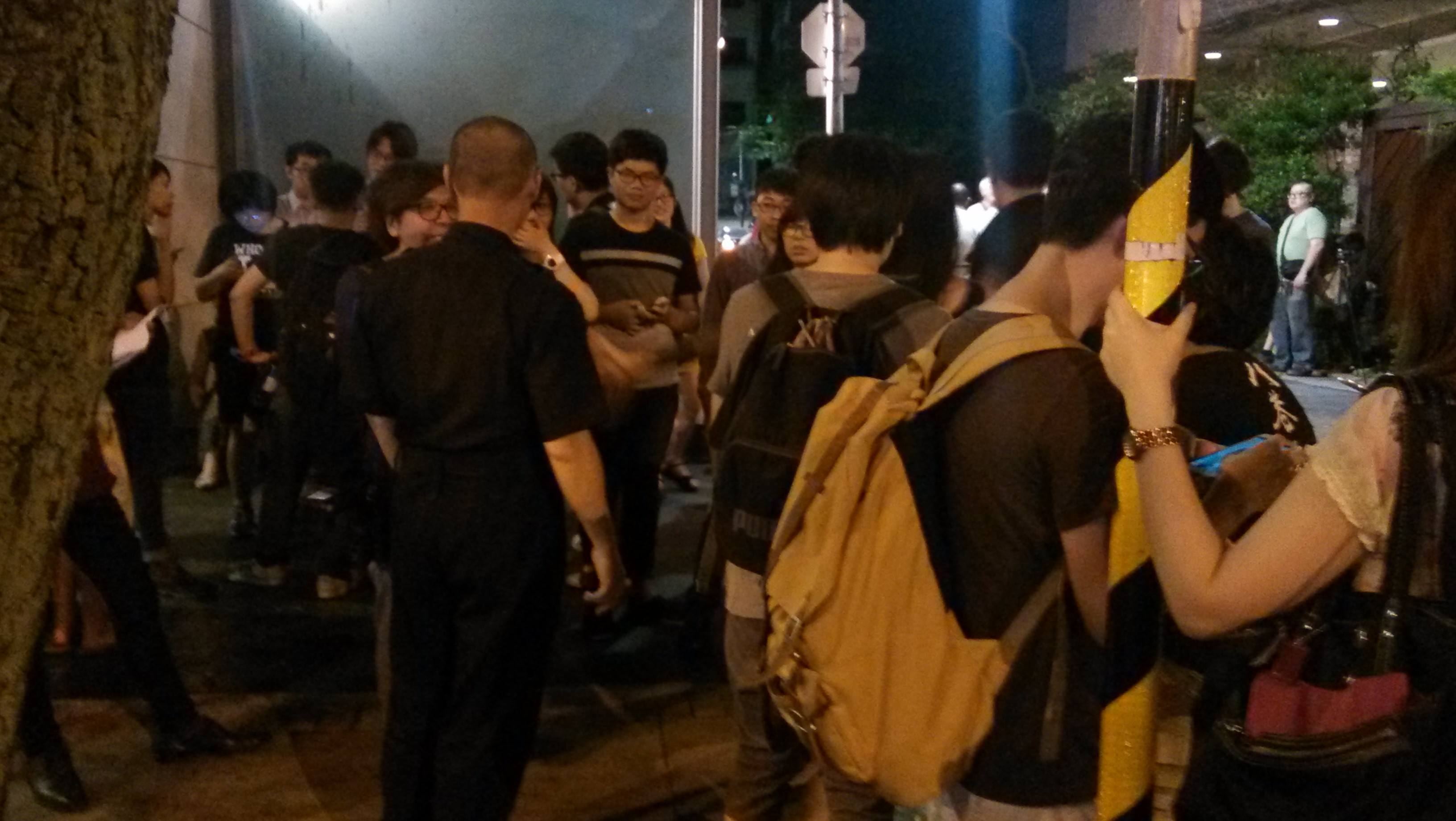 Taiwanese Hydis supporters ten minutes after the dismantlement of the Hydis encampment. Photo credit: Brian Hioe
Taiwanese Hydis supporters ten minutes after the dismantlement of the Hydis encampment. Photo credit: Brian Hioe
The hunger strike began after two Hydis workers were deported last week after being arrested during a demonstration. After police demolished the encampment where Hydis workers had been camped out for 16 days, arresting eight, a confrontation between largely Taiwanese Hydis supporters and police took place at Zhongzheng First Police Precinct, with Hydis supporters being forcibly removed around 3 AM, and demonstrators gathering again outside the National Immigration Agency at 9 AM of the following. A dramatic attempt to storm the airport to protect the workers also took place but was unsuccessful—and now the eight arrested been deported. Efforts on behalf of Hydis workers continue, however, with a demonstration yesterday in front of the Taipei city government building that included a confrontation with Ko Wen-Je, who denied that the police crackdown had occurred under his authority.
Yet what the actions of the Taipei police in the last several days have demonstrated is not only racism, as can be seen in the how police treated Hydis workers, but, as can be seen during the initial arrest of Hydis workers and the reaction to Taiwanese Hydis supporters who rallied afterwards, Taipei police has become prone to overreacting with overwhelming force to protests. It may be that following the protests of the past year, police departments in Taipei have become more aggressive in how they respond to civil society protests. But we can also point towards racism on the part of the Taipei police as a reason for why they would react so violently this time around.
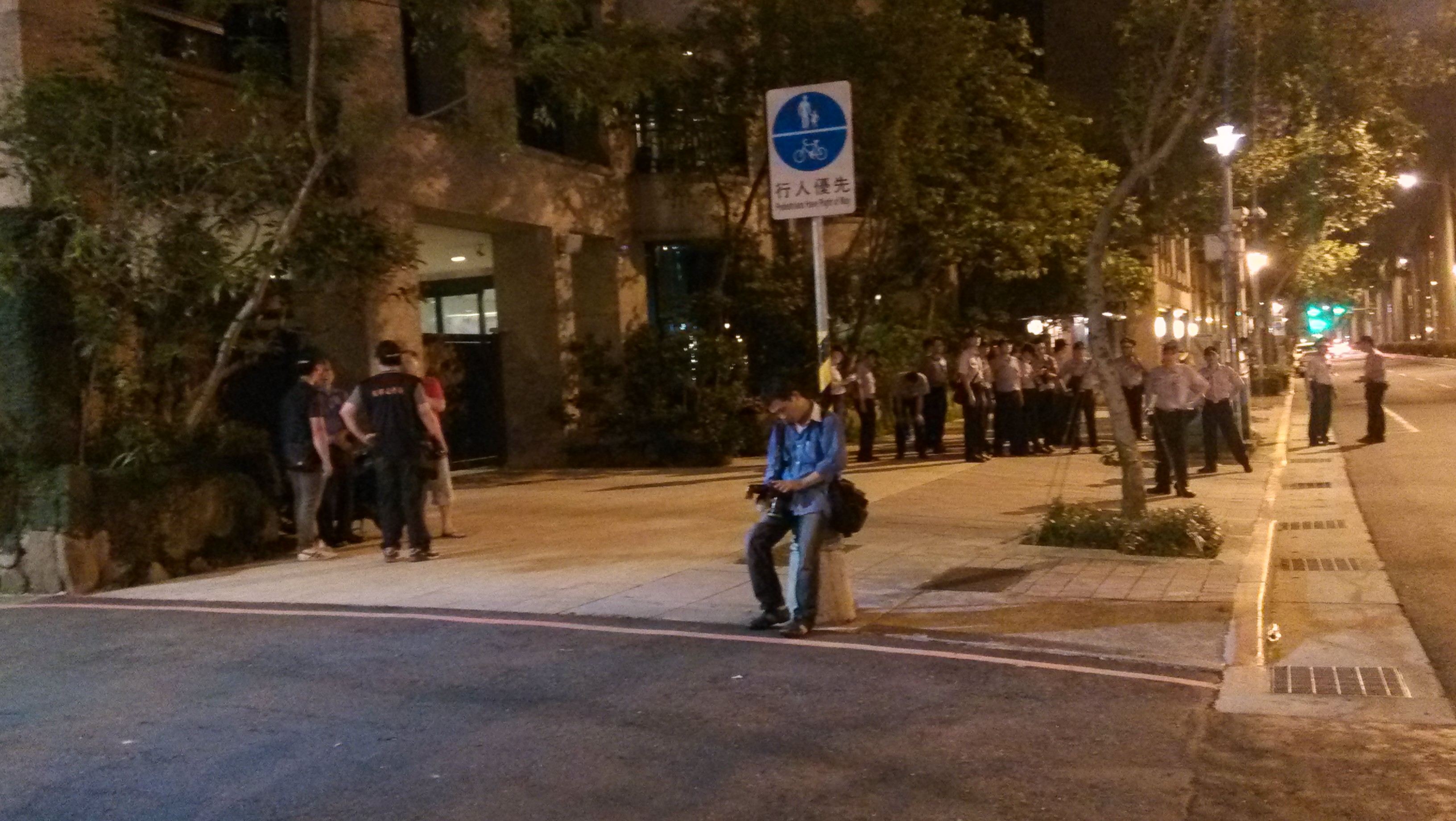 Remaining police after the dismantlement of the encampment. Photo credit: Brian Hioe
Remaining police after the dismantlement of the encampment. Photo credit: Brian Hioe
More generally, how can we relate this to the broader question the role of Taiwanese-owned companies who own factories in other parts of Asia, and are often responsible for exploitative conditions? The most infamous example is, of course, Terry Gou’s FoxConn, but we can also point to examples in Southeast Asia, particularly Vietnam. How are we to understand Taiwan’s relation to these circumstances and the attempts of Taiwanese activists to act in solidarity with these workers or make redress for what are, in some sense, Taiwanese wrongs?
Police Brutality and Racism Against Hydis Workers
WHEN POLICE intervened to break down the encampment where Hydis workers had been camped out for sixteen days, they brought an overwhelming amount of force to dismantle a relatively small encampment. In the end, it was eight Hydis workers and two of their Taiwanese supporters who were arrested, but at the time of the arrest, there appeared to have been only several dozen individuals on-site. Police brought several hundred personnel and two or three water cannon trucks. This, of course, seemed like overkill when there were probably no more than thirty or forty individuals on-site, never mind what effect firing water cannons would have on the bodies of already weakened hunger strikers. At that point, hunger strikers had been striking for over 150 hours, and had dangerously low blood sugar. One, in fact, collapsed during the raid. Police seemed to be prepared for a full-scale riot to break out, rather than the relatively small gathering it was.
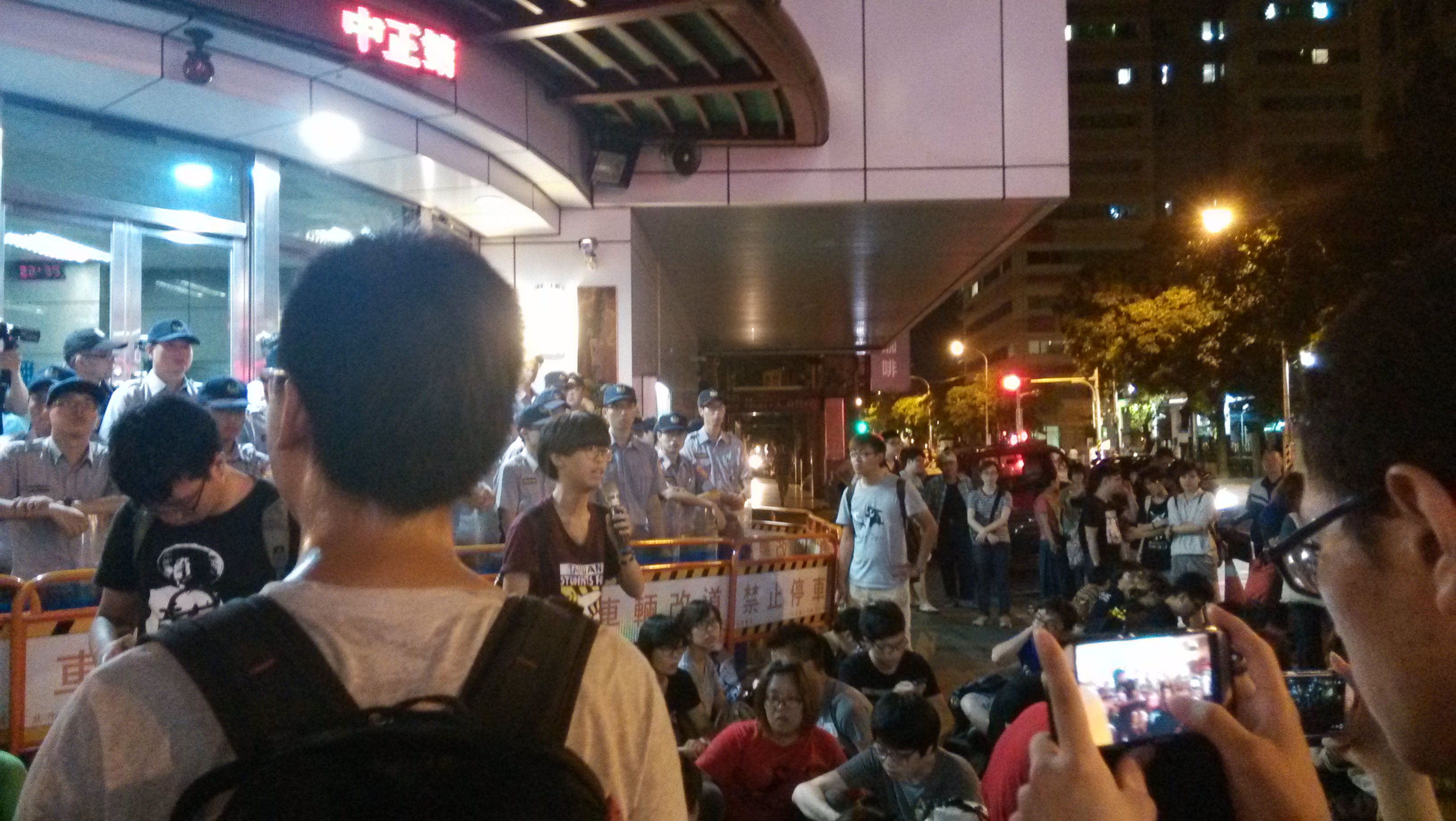 Taiwanese Hydis supporters gathered outside of Zhongzheng First Police Precinct. Photo credit: Brian Hioe
Taiwanese Hydis supporters gathered outside of Zhongzheng First Police Precinct. Photo credit: Brian Hioe
The racism of Taipei police can was also be evident in their relentless questioning of protestors to determine whether they were Korean or not, talking about Korean workers in a derogative manner as though Koreans would not be able to understand them, and shouting at Koreans in broken English, “This is Taiwan! No Korea!” “Get out Koreans!” seemed to be what they were trying to say.
As I witnessed myself in accompanying Taiwanese Hydis supporters to Zhongzheng First Police Precinct, the police response to what were, at the time, only forty protesters or so was also extreme in measure. Ten minutes after protesters arrived, one hundred police with riot shields were mobilized. Actually, to shield off the entrance to Zhongzheng First Police Precinct, probably only 40-60 police were needed, so the rest crowded inside the station as though to prepare for a siege—which, of course, did not happen – the protest remained entirely peaceful and never once progressed towards violence, even though tempers flared in verbal sparring with the police. While Zhongzheng First Police Precinct is frequently a site of confrontation between protesters and the police, rare is such a large-scale response to defend the station.
If dialogue was never established with the police, it was because of their obstinacy in speaking in platitudes which never moved beyond, “The Republic of China assures freedom and justice in its constitution.” This, of course, seems like phrasing bound to push the buttons of many civil society activists, who identify with “Taiwan” rather the KMT’s ghost-country of the “Republic of China”, and many of whom advocate constitutional reform precisely out of a conviction that the constitution does not assure freedom and justice.
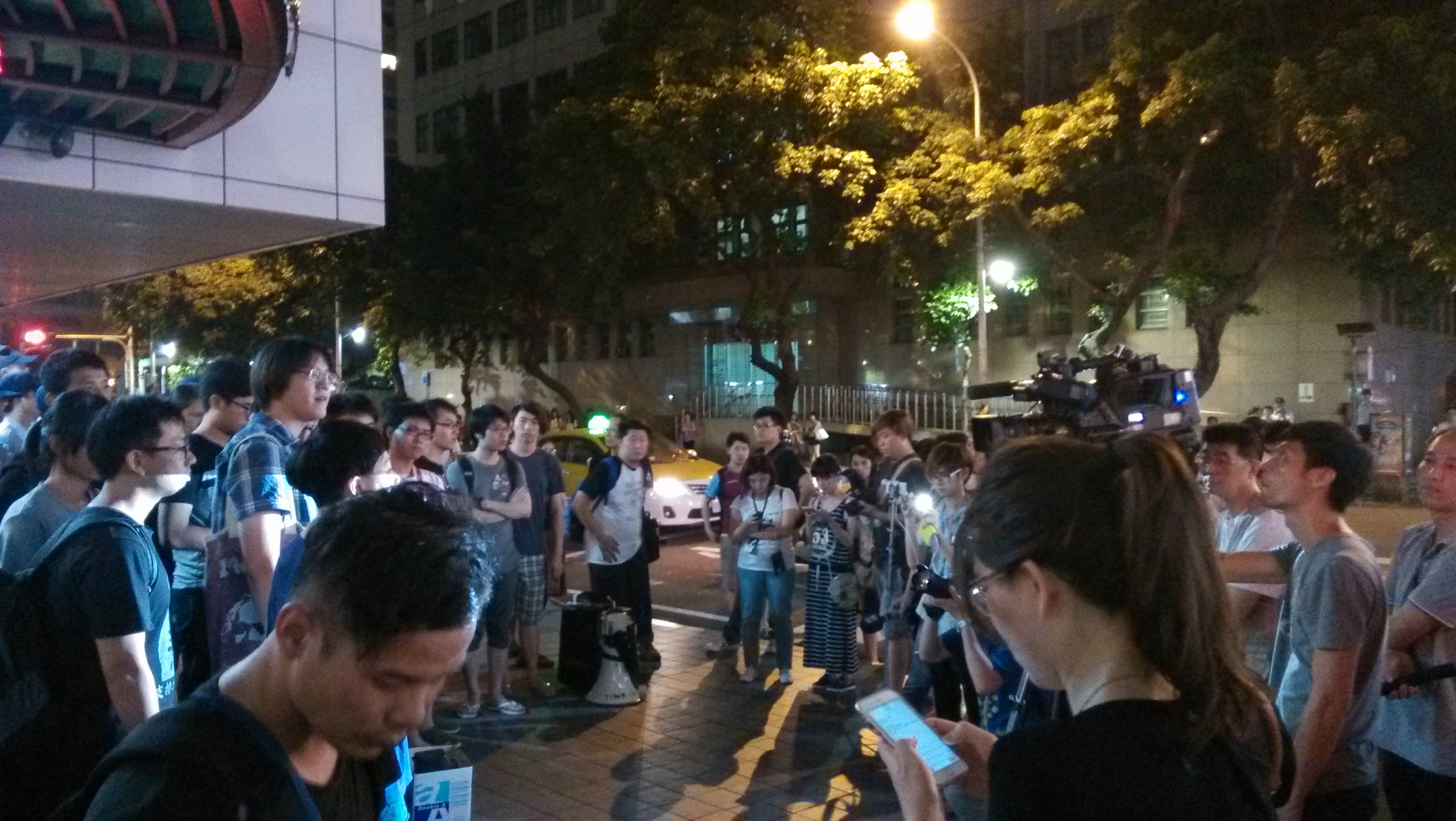 Demonstrators examining their cell phones. Photo credit: Brian Hioe
Demonstrators examining their cell phones. Photo credit: Brian Hioe
But while it may be that the police response to Hydis workers was particularly heavy-handed because of the racism of the Taipei police towards South Koreans as the Hydis workers. This is not to accuse the Taipei police closets an internal culture of racism the way, for example, we see in New York City, just that Taipei police have taken in certain attitudes which come from Taiwanese society more broadly. Namely, I would suspect the police, who see themselves as the guardians of society in Taiwan, saw themselves as defending Taiwan from a foreign threat. Hydis workers were foreign and so, despite having entered the country through totally legal means, they were threats to the nation that must be expelled. The perceived threat was magnified, too, because of the notion that it was a foreign one.
There is the grotesque discourse which circulates in the Taiwanese media, after all, that somehow twists the situation so that it is Hydis workers who are threatening Taiwanese society, through disrupting the fabric of social order. So rather than seeking justice in Taiwan, it becomes that Hydis workers are perceived as threatening outsiders to Taiwanese, anti-Taiwanese, and made to generally seem reprehensible. This discourse sometimes draws on that Taiwan and Korea are competitors on the global market, particularly regarding the electronic industries. So it becomes a matter of national pride, as well.
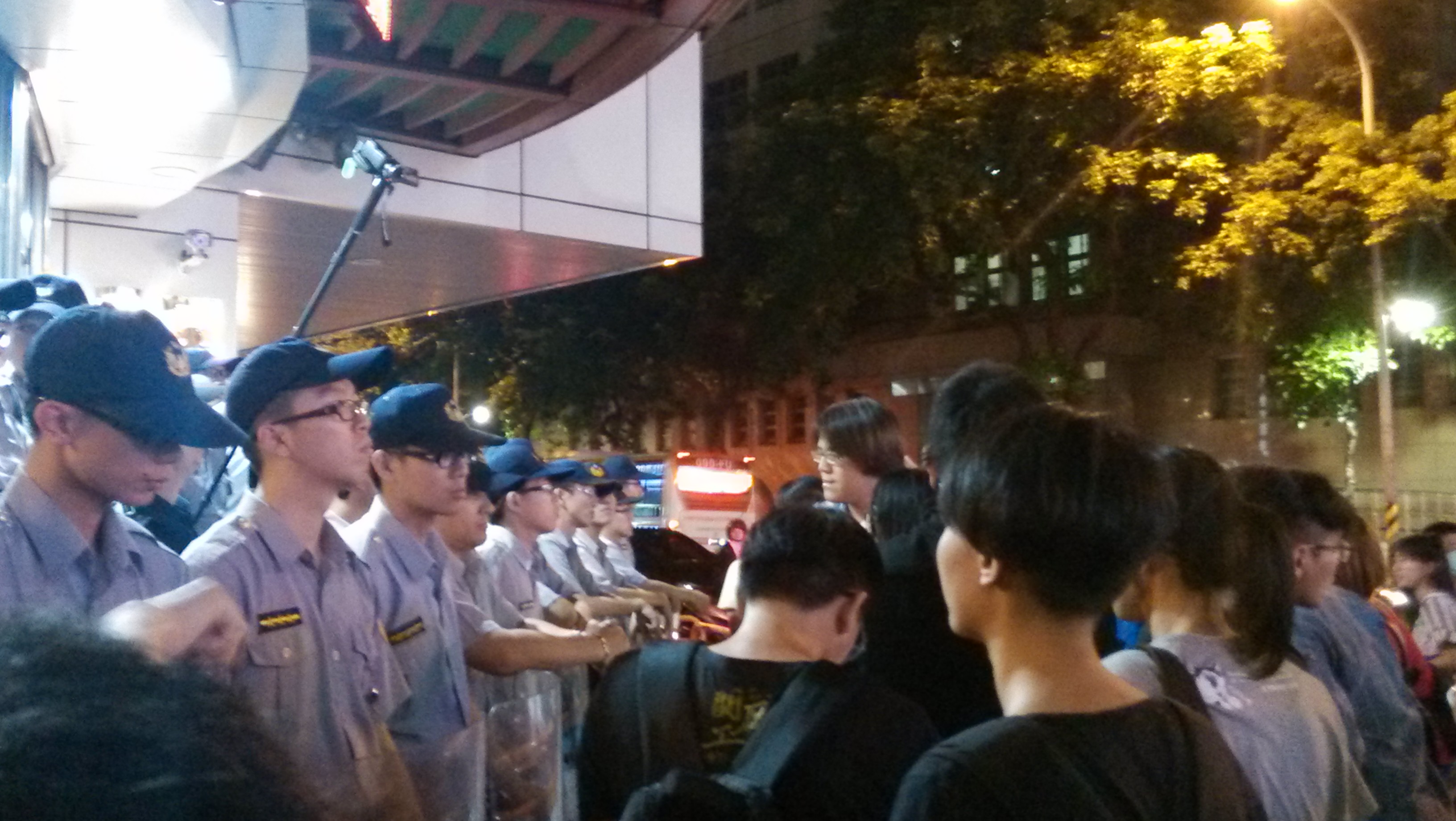 Verbal confrontations ensued between demonstrators and police. Photo credit: Brian Hioe
Verbal confrontations ensued between demonstrators and police. Photo credit: Brian Hioe
And the police certainly did seem to express this sentiment, an attitude we might term something like “soft racism”. During the confrontation with police at Zhongzheng First Police District, in dialogue with protesters, the acting police chief raised at a point that Taiwan, er, I’m sorry, the Republic of China, allowed for foreigners to enter so long as they have work in Taiwan, but that Hydis workers did not fit under this category. And during the raid on the encampment of Hydis workers, activists were told by officers that they should stick to matters regarding Taiwan. South Korea, that’s someone else’s problem. Why care about somebody else’s problem?
Questions of International Justice
HYDIS WORKERS came to Taiwan as a result of acquisition of the company they work for, Hydis Technologies, by a Taiwanese company, Yuen Foong Yu Group. It was Yuen Foong Yu Group which made the decision to lay off hundreds of Hydis workers and close a factory, the acquisition of Hydis Technologies happening in 2008 but layoffs only beginning to take place later. Hydis workers had been hunger striking and camped out of the home of Yuen Foong Yu Group chairman Ho Shou-Chuan. Of course, Ho Shou-Chuan was not living there at the time but had fled to another one of his properties.
More broadly, the plight of Hydis workers is not unique. Taiwan, of course, as a more developed economic power relative to other Asian nations, sometimes can act in the role of exploiter. The most infamous example of course is FoxConn, which often sees news about worker suicides, owned by the Taiwanese Terry Gou. However, Taiwanese owned factories are also to be found across Southeast Asia, manufacturing is outsourced to Southeast Asia because it would be cheaper than to manufacture in Taiwan.
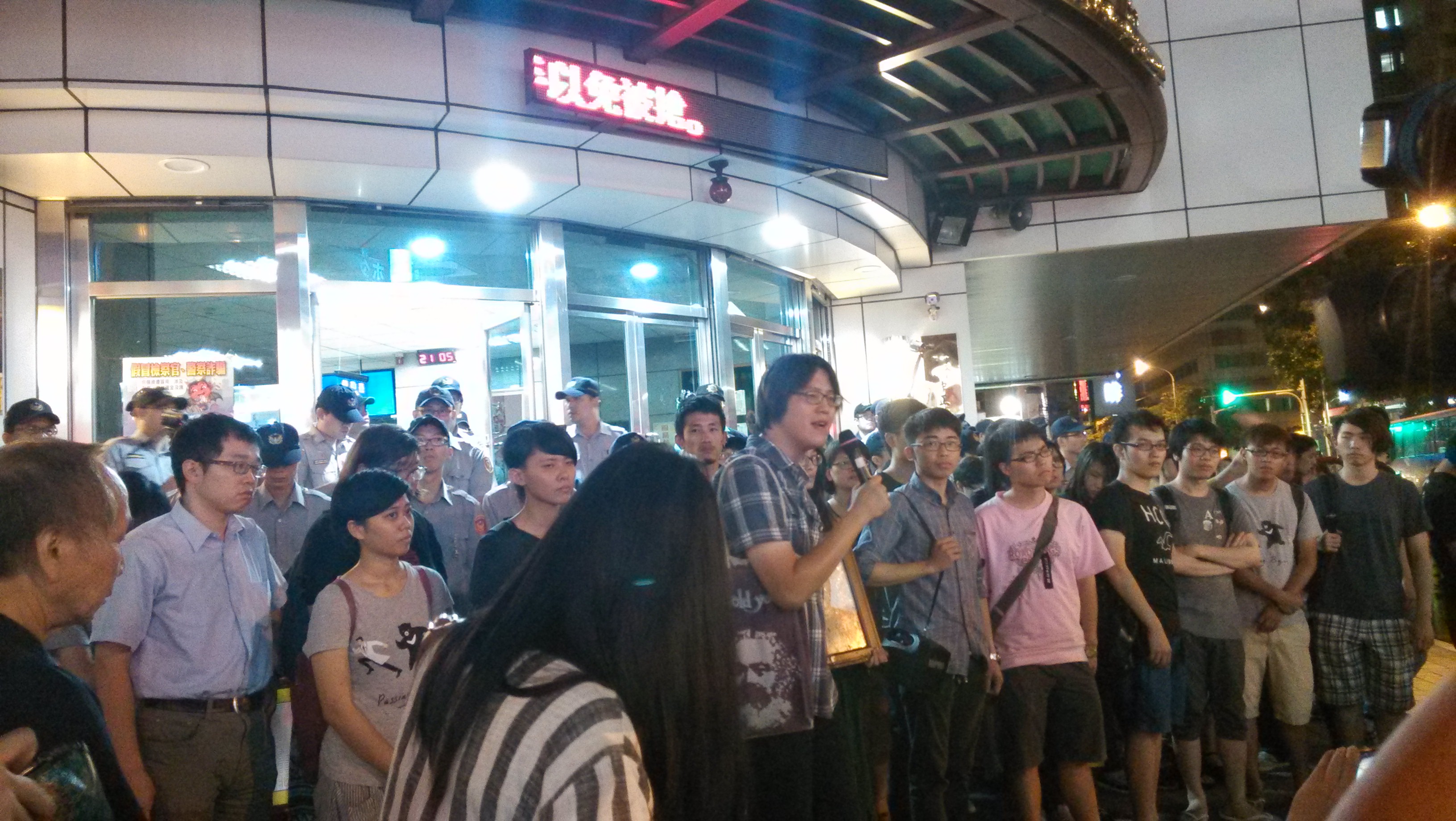 Speeches by organizers in front of Zhongzheng First Police Precinct. Photo credit: Brian Hioe
Speeches by organizers in front of Zhongzheng First Police Precinct. Photo credit: Brian Hioe
Where Taiwanese-owned companies have unethical or exploitative labor practices towards their workers, the international image of Taiwan suffers. So it is, then, that Taiwan becomes unsympathetically viewed by residents of surrounding nations as, in fact, a capitalist exploiter. At times, China has stepped in on that basis, offering development projects and other benefits and projecting a less exploitative image than Taiwan, in order to take business away from Taiwan as well as negatively influence its reputation. Indeed, if played a certain way, Taiwan would almost appear certainly at fault here in the Hydis case, as a exploiter and oppressor of South Koreans.
But it is, as one spokesman of the Taiwan International Worker’s Association which has been coordinating activities in support of Hydis workers, this isn’t a matter of Taiwanese and Koreans, this is a matter of capitalists and workers. Actually, there is a need for Taiwanese labor to make efforts more broadly to establish with the foreign workers who are being exploited by Taiwanese companies, so that international organizing can take place. The Hydis struggle is one of the few cases where this has actually very happened.
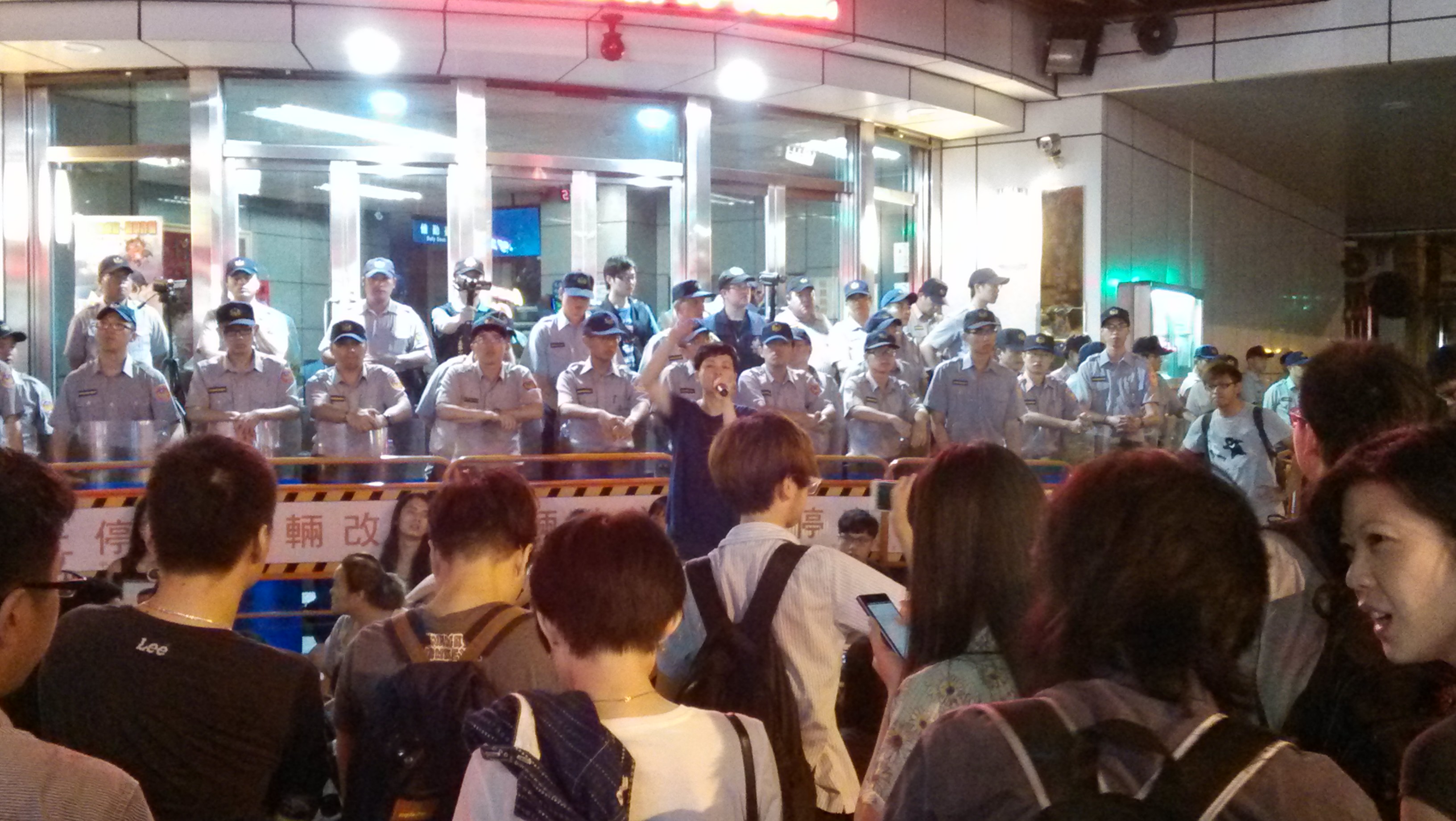 The police amassed in front of Zhongzheng First Police Preinct all carried riot shields. Photo credit: Brian Hioe
The police amassed in front of Zhongzheng First Police Preinct all carried riot shields. Photo credit: Brian Hioe
After all, very often, what just happens is that organizers from Taiwan and organizers from another country, say, Vietnam, might establish contact and declare a sense of shared cause and struggle, but very little in the way of actually coordinated international organizing happens. In this sense, if the international working class is actually to unite itself, it needs to go beyond just individuals in one country declaring “solidarity” with individuals in another country. This may be what is most necessary in the present moment, but it rarely happens. Yet it happened here with Hydis workers and, if the issue is still far from resolved, the sympathy of Taiwanese supporters towards Hydis workers and the gratitude of Hydis workers towards their supporters is not only touching, but a step forward for cooperative efforts by the international working class.
Conclusion: What Now?
THE CHALLENGE OF organizing going forward may be coordinating with Hydis workers and seeking to keep the issue in the public limelight if Hydis workers are not able to return to Taiwan. More worrisome, through all this, the Yuen Foong Yu Group, too, has largely been able to keep out of the limelight and avoid confrontation.
However, it may be that the other challenge faced by Taiwanese Hydis supporters, too, is to counteract the attitudes which proliferate in Taiwanese society against Hydis workers, as expressed by the police or others. What activists will need to do is to demonstrate to Taiwanese society that questions of justice go beyond borders. Apart from the broader question of public apathy, it is the national boundaries put into place by international capitalism, which pits the people of one nation against the people of another as competitors on the global marketplace, that impede Taiwanese from seeing Hydis workers as wronged. Taiwanese have yet, too, to see how they might be culpable for the unethical labor practices of what goes on elsewhere.
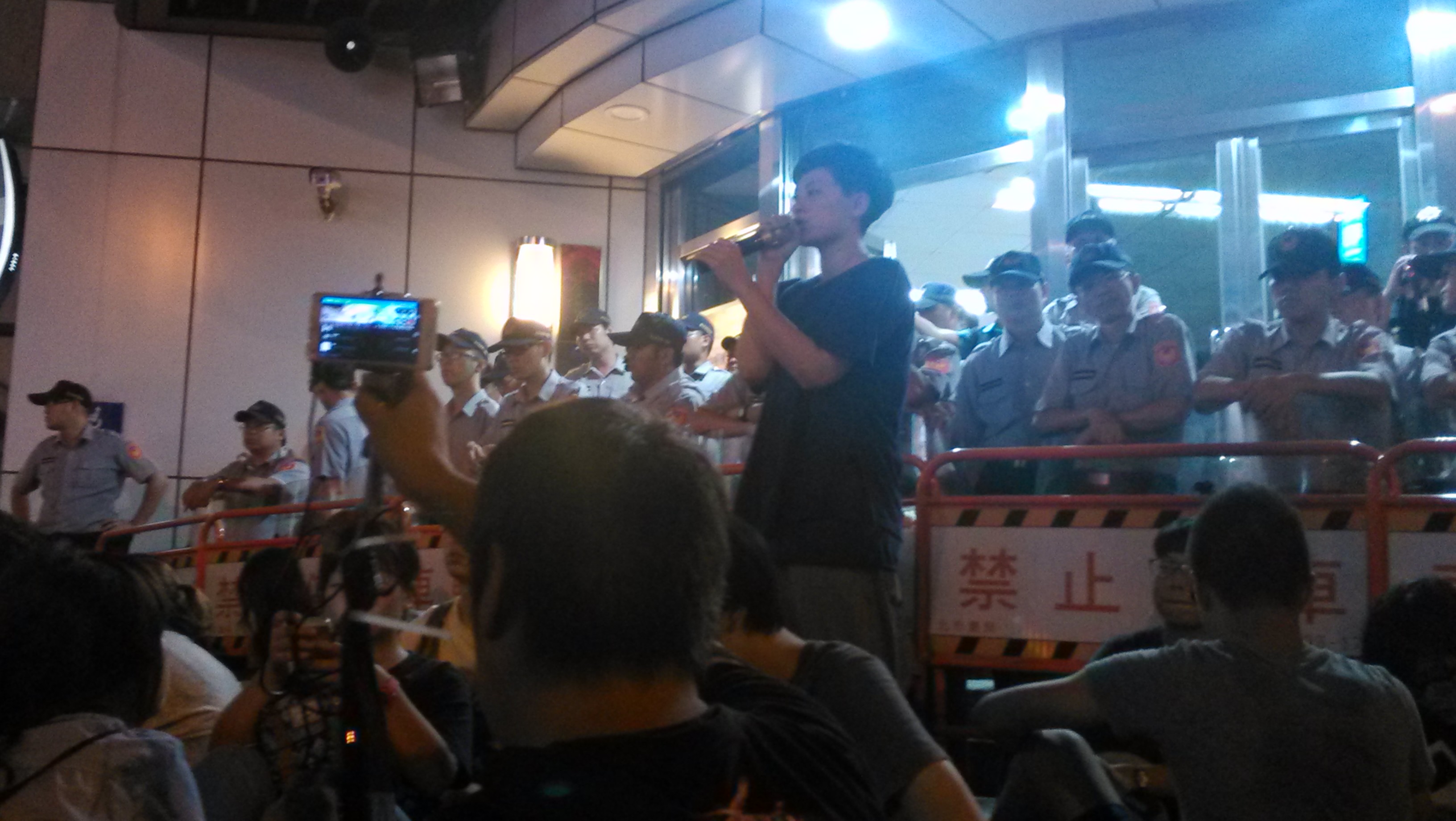 Photo credit: Brian Hioe
Photo credit: Brian Hioe
Will activists succeed in their struggle? Certainly, that is to be seen. But even then, the Hydis struggle is just one of many such struggles in similar vein, alongside the struggles of workers all across the world, and in that light, the road to be walked remains long.


 Taiwanese Hydis supporters ten minutes after the dismantlement of the Hydis encampment. Photo credit: Brian Hioe
Taiwanese Hydis supporters ten minutes after the dismantlement of the Hydis encampment. Photo credit: Brian Hioe





